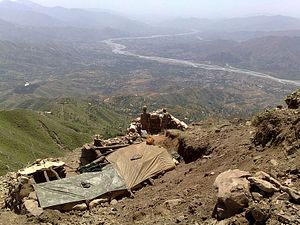On January 8, the head of the Lashkar-e-Jhangvi (LeJ), an insurgent group involved in sectarian killings designated as a terror group by the United States, reportedly died in an encounter with Punjab’s law enforcement agencies. About a year ago, the militant organization’s founder, Malik Ishaq, also died during an encounter with the police.
After the death of Malik Ishaq, the group’s militant activities increased greatly: a majority of the suicide bombings that took place in Pakistan last year were carried about by different factions of LeJ. The killing of the group’s new chief about two weeks ago has already become the latest reason for the organization’s militant backlash. Last week, LeJ took responsibility for a suicide attack in a busy market near the Afghan border in Pakistan’s tribal areas that resulted in the death of at least 21 people.
The group’s recent bombing close to the Afghan border should be a cause of concern for Pakistan’s security agencies. The threat in this regard is twofold: first, the LeJ’s unrelenting campaign of suicide bombings in the face of the most brutal counter terrorism campaign shows that the group still retains adequate militant infrastructure to frustrate Pakistan’s efforts to capture total control of the state in all forms, including forestalling future militant attacks.
Moreover, the concern in this regard also stems from militants ability to target the state at will. So far, a majority of the attacks carried out by the LeJ were either the result of the state direct action against the outfit or it was the consequence of the group’s own hard-line ideological belief that places the country’s minority Shia Muslim population on the receiving end of violence.
The second major concern about the group’s continued relevancy in the country’s militant domain comes from its sanctuaries abroad. The group is believed to have developed safe havens in Afghanistan. The recent attack that took place near the Afghan border in the Parachinar district of Kuram valley was the consequence of the Pakistani Taliban alliance with the LeJ. The Pakistani Taliban that fled the country about two years ago to escape the country’s military operation in the tribal areas along Afghanistan are also believed to have found shelter across the Durand Line.
The LeJ’s association with the Pakistani Taliban in Afghanistan appears to have opened another challenge for the country at a time when the organization is expanding its foothold in the country’s urban areas: “Lashkar-e-Jhangvi is a more lethal outfit than TTP because it has taken the fight into the cities,” said the former Inter-Services Intelligence (ISI) chief, Lt-Gen (retd) Zaheer ul Islam in a recent interview. It’s more likely that the Pakistani Taliban may join forces with the LeJ’s network inside Pakistan to rebound its own campaign of violence that has subsided in the last two years.
While the containment of the group’s infrastructure inside the country appears within the state’s reach, LeJ’s bases in Afghanistan are expected to become a long-term challenge for Pakistan. While Pakistan has conveyed its reservations to the Afghan government about the safe havens various militant groups enjoy in the country, it’s unlikely that Afghanistan will take any measurable action to assuage Pakistan’s concerns. Afghanistan’s inaction in this regard may perhaps be the result of Pakistan’s own alleged inaction against the Afghan Taliban, whose leadership is reportedly based in Pakistan.
The government in Afghanistan blamed Pakistan for the recent bombing in Kabul that killed scores of people. In response, while Pakistan denied accusations made by the Afghan government, the Chief of Army Staff in Pakistan in a statement said that all safe heavens of terrorists were eliminated from the country. It’s probable that militant groups fleeing to Afghanistan, particularly the LeJ, may take advantage of the feud between the two countries. In the coming weeks and months, the LeJ may accelerate the pace of its militant activities across the country.
Effective intelligence-sharing domestically and management of issues related to cross-border terrorism can go a long way in helping Pakistan address its terrorism problems successfully.

































